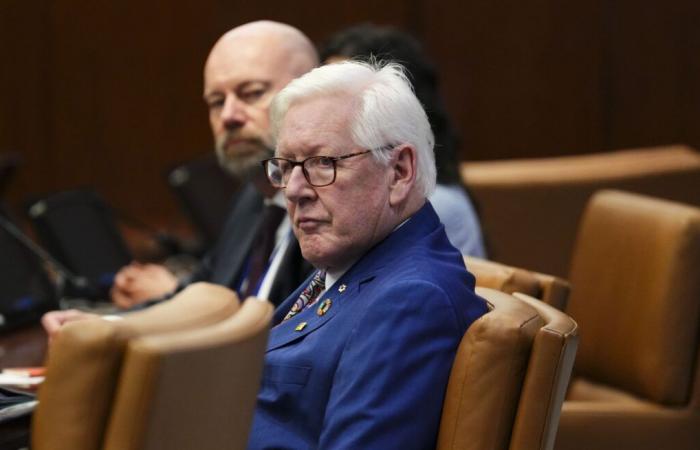Canada is trying to push the nations of the world to respect the objectives they have set to face the planet’s main challenges, despite the rise in geopolitical clashes which have made the 2030 deadlines more difficult to meet.
“There are many reasons why you could say it’s impossible, but we can’t let those reasons make us give up,” said Bob Rae, Canada’s ambassador to the United Nations.
Last summer, he began a one-year term as head of the U.N. Economic and Social Council, a body that manages several agencies and most of the U.N.’s global budget.
The council, nicknamed ECOSOC, was created at the founding of the UN to coordinate the work of its agencies, including refugee aid, pandemic response and global rules governing civil aviation and postal services. .
In recent years, the council has tried to help countries achieve the Sustainable Development Goals, a series of achievements that the world has agreed to try to achieve by 2030 aimed at paving the way for ending the extreme poverty, meet carbon emissions reduction targets and eliminate preventable serious diseases.
The UN says these goals are “woefully behind schedule” due to increases in recent years in greenhouse gas emissions, extreme poverty and hunger. The UN is trying to reform itself to be more effective and give more voice to developing countries, but it is hampered by geopolitical changes.
The entire global system is also bracing for possible resistance from US President-elect Donald Trump, whose policies could also cause widespread economic disruption.
Mr. Rae acknowledges that the UN currently faces “intractable problems”, with the highest number of active conflicts since its founding, the highest number of displaced people on record and the continuing economic impact of the COVID virus -19.
“It’s a huge challenge to bring it together and refocus it,” Mr. Rae said of the UN.
Yet he sees plenty of reason for hope: Before the COVID-19 pandemic, the world had made decades of progress toward eradicating disease with vaccines and reducing extreme hunger and maternal deaths with technology. .
“It is precisely because everyone is more and more informed and more articulate about the challenges we face that we forget how serious they were before,” he stressed. This, I think, reinforces the sense of the difficulty of the situation, but we must not let it overwhelm us. »
Rae said the world could not have overcome COVID-19 without global collaborative systems to create and share vaccines and public health measures.
Actors who don’t always agree
Global progress includes work led by countries often at odds with Canada. “The two major significant advances in changing and improving global poverty figures have been the success of China and India in promoting economic development,” Rae said. The multipolarity of these changes is very clear. But we still have this overall goal and we need to talk to each other. »
He was encouraged that African states rebuffed an attempt by Russia last September to derail a vote to reform the UN at a major summit. Moscow claimed that the reform was biased in favor of Western countries. Mr Rae believes this demonstrates an interest in progress rather than geopolitical “histrionics”.
For him, the Sustainable Development Goals embody “the common sense of humanity”, requiring governments to monitor progress and avoid duplicating efforts.
Mr Rae noted that the UN could harness artificial intelligence to better monitor progress and combat corruption, for example by improving monitoring of illicit financial transactions.
Canada could also accelerate the achievement of these objectives by fully integrating them into its budgets at all levels of governance, he said. Ottawa sometimes reports progress and asks the Auditor General to assess compliance with these global goals.
He added that real progress is impossible without the full participation of women and girls in education and employment opportunities.
Canada’s place at the UN
Mr. Rae began his job as Canada’s senior ambassador to the UN shortly after the country failed to secure a seat on the Security Council, and he said Ottawa was considering the presidency of the ECOSOC as a way for Canada to remain relevant at the United Nations, a body where it has historically had great influence.
“Canada has always played a very important role politically in these files, in addition to insisting on better coordination and greater efficiency,” he said.
The main part of Mr. Rae’s role as head of the Economic and Social Council will begin in February, when the Council will experience an intense cycle of meetings on the functioning of agencies, such as the World Health Organization, UNICEF and the United Nations Refugee Agency.
“There are very few press releases or drama about it, except that it is the ongoing life of the world. »
He finishes in July. Success for him would be if UN member states view reform as something to be done on an ongoing basis by working together, instead of letting problems fester.
He also argued that emphasizing military defense at the expense of development would only increase the factors that lead to wars.
“We can’t look at things in silos in a siled way,” he said. If we abandon our commitments to international development, it will worsen the world security crisis, I guarantee you. »






